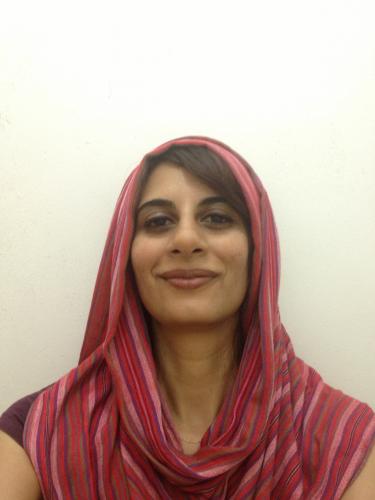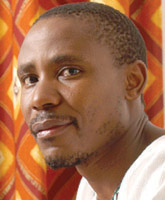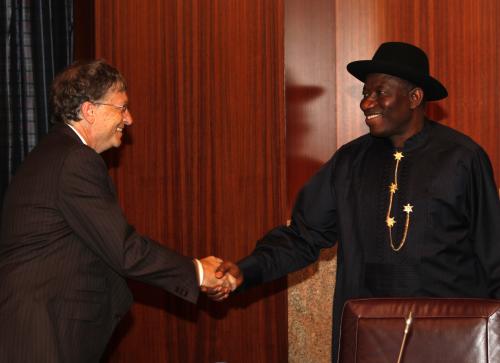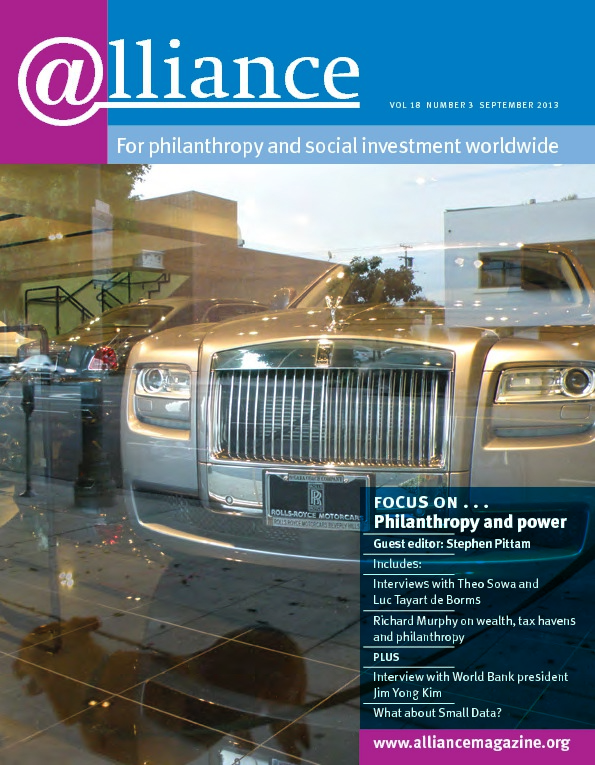 ‘The dilemma of the poor is not about resources. It is about power. If the poor have power, they will leverage the resources needed.’
‘The dilemma of the poor is not about resources. It is about power. If the poor have power, they will leverage the resources needed.’
Adam Habib, Vice Chancellor, University of Witwatersrand
Adam Habib’s remark, made at the 2012 African Grantmakers Network Assembly on The Role of African Philanthropy in Shifting Power from North to South, is a stark reminder to us of the need to change the way we view the relationship between resources and power. In our philanthropy world, too often power is equated with money, and the one who holds the money dictates the agenda. For philanthropic agencies, the dilemma is how to ensure that their resources are not used as tools of power and control.
 Any discussion of power has to be situated within context. In Africa, there are glaring power imbalances at all levels of society and they take many different forms – gender relations, asset ownership and resource rights, patriarchal systems, political decision-making, age, race and ethnicity, among others. The ways in which our societies choose to understand, situate and govern power is central to how the institutions within society evolve and the roles they seek – and choose – to play. It is here that the personal is political, and the political is personal.
Any discussion of power has to be situated within context. In Africa, there are glaring power imbalances at all levels of society and they take many different forms – gender relations, asset ownership and resource rights, patriarchal systems, political decision-making, age, race and ethnicity, among others. The ways in which our societies choose to understand, situate and govern power is central to how the institutions within society evolve and the roles they seek – and choose – to play. It is here that the personal is political, and the political is personal.
As we examine the issue of power in philanthropy, we should be mindful that too often the ways in which power plays out are often directly rooted in the broader power inequalities within society. Yet in philanthropy, the question of power is often relegated, even ignored. This is to our peril: without acknowledging, examining and confronting the power question, we risk being untrue to ourselves and, in the process, undermining our efforts at achieving a more just society.
The politics of power
During a recent conversation on philanthropy and power at the Working Group for Social Justice and Peace, a question was asked: is there a common discourse in the Global North and the Global South around power? Perhaps the real question is whether there is a discourse at all? The international aid system and the way in which its resources have been used as tools to determine agendas has been much discussed (one need only look at the many critiques of the IMF and the World Bank), and international foundations have supported voices to advance this discourse. Surprisingly, those international foundations often fail to recognize that they are themselves a part of that same aid system. As a result, the discourse is seen to apply to ‘others’ out there – bilateral/multilateral aid agencies, global financial institutions, international NGOs, etc. The foundations do not look at themselves and consider whether they too are complicit in perpetuating this imbalance.
A second question is: should there be different discourses? While there are increasing concerns about external funding reproducing the colonial structure of the economy; about social and political agendas for Africa being set outside Africa; and about philanthropic funding as a tool for establishing the legitimacy of external frameworks, power imbalances are not just the domain of international aid. There is also a power dynamic within local philanthropy. In Africa, a variety of formal philanthropic institutions exist. Some emerged with local money, some rely almost entirely on international funding and some are a mix; each has to negotiate and manage the power associated with the funds they have. There are increasing concerns about African elites’ interests setting agendas that are not in the interests of all; about the use of philanthropy to offset exploitative business practices; and about philanthropy deliberately ignoring the web of social, political and economic structures through which it exists. So, while where the resources come from matters at one level – African resources provide legitimacy, a better seat at the table, increased say in decisions, and leverage to assert local agendas – geography alone is not a predictor of how power will play out. Neither is size. The question of how power is exerted should be as much a concern for a Congolese or Namibian community foundation as it is for an international foundation based in the US or Europe.
The third question that needs to be asked is: what should a discourse on philanthropy and power be mindful of? While power can be experienced and exerted in various ways by different types of institution, and while strategies to negotiate and manage power may differ, the core issues around local agency and how agendas are developed needs to lie at the centre of the discourse on power. But in doing so, several challenges present themselves.
Challenging the dominant narrative
At one level, the narrative of philanthropy in Africa has long been dominated by a ‘Global North’ perspective, and this has shaped not just how our formal philanthropic institutions operate but the very nature of what is acknowledged as ‘philanthropy’. At another level, even within Africa, many philanthropic institutions have emerged from segments of society that are elite and urban or from the private sector; or have been created by international actors with a particular approach. Together, these have developed a narrative of philanthropy – from rich to poor, through formal institutions, based on money and individual (high net worth) giving at scale. This is often far from what philanthropy in Africa is actually like – where giving emerges across socioeconomic classes; through individual and communal channels (formal or informal); often not involving money and through simple and complex communal arrangements that, cumulatively, occur at significant scale.
As we look at power and philanthropy in Africa, we first need to change the dominant narrative to one that gives due place to the informal giving that is most characteristic of African philanthropy. This narrative should also take account of the fundamental role that this ‘unrecognized’ giving plays within African society and seek to challenge the notion of Africans as the ‘undeserving’ poor – un-deserving of aid and power. We do not imply here that these African systems may not themselves include relations of power; as we seek to build knowledge and develop our narratives, we must also constantly be questioning the power dynamics inherent within them.
Dissociating power from identity
Who the money comes from is often just as important a determinant of power as where it comes from. In a context where power is intricately bound to notions of identity, or configurations of identities – class, race, gender, age, education, background, experience and geography among others – the ways in which power relations play out are very much influenced by the identity(ies) of the parties on both sides of the power equation. For instance, a challenge to the philanthropic directions of an African male, who was educated at a prestigious foreign university and holds significant weight within his traditional cultural system, becomes a challenge not just to his philanthropic leanings but to the identities that have informed these leanings.
 Or look at any of several African governments and compare the ways in which they engage with local foundations that support civil society efforts to increase state transparency and accountability with the ways in which they engage with a foundation led by an ex-president from the Global North such as Bill Clinton, talking about the same thing. Or how much easier it is for someone like Bill Gates or Aliko Dangote to convene African leaders than it would be for the African Grantmakers Network. In Africa, unless and until power is dissociated from identity, a critical examination of power in philanthropy and development will be extremely difficult. (Pictured: Bill Gates with Nigerian President Goodluck Jonathan at the Presidential Villa in Abuja, Nigeria, 29 September 2011. Photo by Gates Foundation.)
Or look at any of several African governments and compare the ways in which they engage with local foundations that support civil society efforts to increase state transparency and accountability with the ways in which they engage with a foundation led by an ex-president from the Global North such as Bill Clinton, talking about the same thing. Or how much easier it is for someone like Bill Gates or Aliko Dangote to convene African leaders than it would be for the African Grantmakers Network. In Africa, unless and until power is dissociated from identity, a critical examination of power in philanthropy and development will be extremely difficult. (Pictured: Bill Gates with Nigerian President Goodluck Jonathan at the Presidential Villa in Abuja, Nigeria, 29 September 2011. Photo by Gates Foundation.)
Letting go of control
History has taught us that development agendas in Africa can rarely be called Africans’ own unless those agendas have been self-financed. History has also taught us that, irrespective of where the support comes from, funding is rarely just funding. It is often accompanied by strings – from prods to highlight a particular direction to parameters or restrictions on whom and what to fund (or not), to explicit instructions on what kind of agenda is appropriate. Many philanthropic institutions bring a distinct level of expertise, experience and insight, but the ways in which these things determine the parameters within which local agendas are set is problematic. While there are certainly examples of foundations that engage in ways that place local agency at the forefront of decision-making, too often local contexts, expertise and insight are ‘considered’ in ways that don’t extend to fundamentally informing programmatic priorities. Those who receive funds (whether community organization or African public charity) find themselves constantly having to compromise between the ideal of local ownership of agendas and the leveraging power that external funders exert. More often than not what we end up with are limitations on agency for change and dilution of local agendas at the tables of power. It is too early to tell if the story will be different with local sources of money, especially with high net worth individuals.
The power of process
Power is not just about explicit/overt control. Any discussion of philanthropy and power must acknowledge the implications of our processes on power dynamics. For African philanthropic institutions, several questions need to be looked at:
Does philanthropy speak truth to power?
To what extent are African philanthropic agencies willing and able to challenge the dominant consensus and ways of working? Is a community foundation able to challenge a well-resourced international foundation (from which they receive funds) when there is a clash between the priorities of the international funder and the agenda of the beneficiary groups it supports? Is an African foundation, working at national level, able to drive the issues they believe require priority or are these things subject to a constant process of mediation and negotiation with international partners or funders?
On the other hand, African foundations must bear some responsibility for allowing this power imbalance to continue. Does our ongoing acceptance of the terms of engagement, and our failure to publicly discuss this issue, not make us as much a party to this dynamic as those who hold the power? Reflections from Sarah Mukasa of the African Women’s Development Fund sum up this dilemma very well.
‘This thing always brings it back down to me and to us as African philanthropic institutions. What are we to do with the messiness in front of us? What choices are we making? In what way/s are these choices challenging, mirroring or enabling these power inequalities to continue (both in what we say and do)? It has to begin with us. And the questions we need to ask ourselves of our thought and conduct are very difficult ones.’
How accountable are local philanthropic actors for how money is made?
With private and corporate philanthropy rapidly increasing, philanthropic agencies need to be accountable for how money is made just as much as for how it is spent. If a resource-based corporation has made its profits from land where people have been dispossessed of their land rights and then engages in philanthropic activity, serious questions need to be asked. Are we to consider that our role as philanthropic agencies justifies our overlooking practices that have produced poverty and injustice? We certainly want to advocate for an increase in organized private philanthropy in Africa, but not at all costs – we need to be mindful of where the line is and set standards for accountability and transparency.
Do the ways in which African philanthropic actors operate entrench elite consensus?
At a social justice philanthropy convening in Johannesburg last year, the point was raised that many African philanthropic organizations are in danger of mimicking the processes and procedures of the Global North. Specifically, the question came out of a discussion about our preference for funding large NGOs with good track records, which perpetuates inequalities within our civil societies, reduces the voices of social movements and community-based organizations, and takes no account of voices that do not fit in with the norm. We were asked to think seriously about whether and how our processes perpetuate forms of exclusiveness.
* * *
For too long power imbalances in philanthropy have dictated and dominated development agendas in Africa. The question for us now is whether we are ready to examine what roles philanthropic actors play, whether these roles are relevant and appropriate to the realities of African societies, and whether we are willing to change them.
As Yao Graham of Third World Network remarked at the Power Panel at the AGN Assembly in 2012:
‘If you don’t have clarity of your own agency, you become someone else’s project.’
This is really the gist of the relationship between power and philanthropy in Africa.
Halima Mahomed is the philanthropy programme adviser at TrustAfrica. Email halima@trustafrica.org
Bhekinkosi Moyo is programme director at TrustAfrica. Email moyo@trustafrica.org



Comments (0)